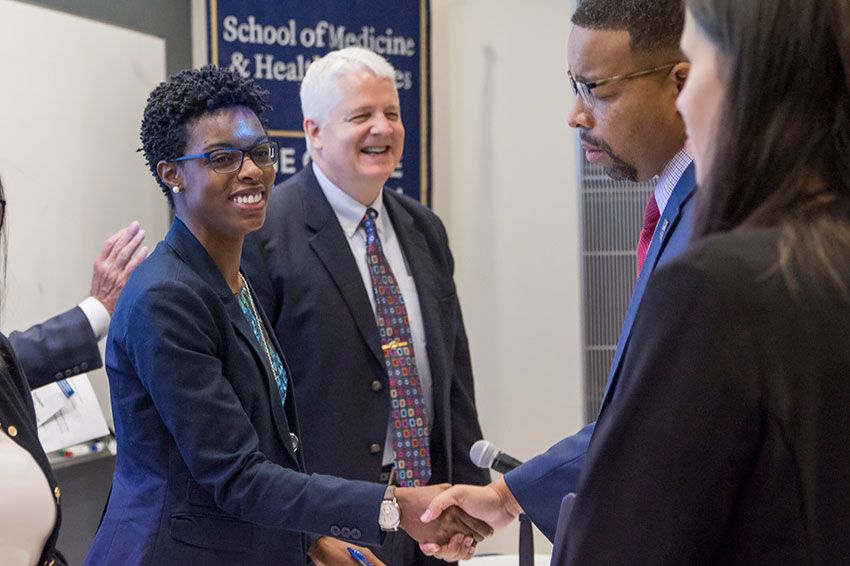
Tuition costs weren’t an immediate concern for Arielle Katcher, B.S. ’13, a fourth-year medical student at the GW School of Medicine and Health Sciences (SMHS).
“With the excitement of being accepted [into medical school], the question of how I would pay for it never really crossed my mind,” she explained at the inaugural Student Debt Symposium, held Oct. 14 on the GW campus. “I was in, and I was going; I would figure out how to pay for it later … To me, it was worth it.”
Katcher, like many who set their sights on a career in health care — including fellow student panelists Bruce Shaver, M.D. ’13, and Jalan Burton, M.D. ’12 — was shocked by her accumulated debt by the final year of school, when she surfaced from the rigors of her school work.
“It’s become harder to live in that blissful, unaware state [as] the prospect of paying back what I owe draws near,” she said, adding that her loan amounts have increased this year due to exam fees and travel costs associated with residency interviews. “To me, my debt is something that I’ll just have to deal with when I have to.”
The burden of financial loans is precisely why SMHS, through a gift from Peter Kovler, member of the GW Board of Trustees and parent of SMHS alumnus Mark Kovler, M.D. ’15, decided to start the conversation on how to ameliorate the issue. “There is a fundamental problem in this country, that we would [allow this much] debt for our finest citizens and our finest students; it’s outrageous that we have this kind of order,” Kovler said.
Julie Fresne, director of student financial services at the Association of American Medical Colleges, one of several medical education leaders presenting at the symposium, explained that nationally 73 percent of medical school graduates have an average debt load of $180,000. With interest, some students might owe more than $300,000 by the time they leave school.
What’s key, however — and one of the objectives of the symposium — is looking for solutions. Fresne explained that repayment programs, such as Pay As You Earn, have capped maximum payments, and students who qualify for Public Service Loan Forgiveness may see the bulk of their loans forgiven. Employers, such as the National Institutes of Health, United States Public Health Service, and the U.S. Air Force, also offer scholarships and aid with loan repayment, she said.
Some medical schools are exploring ways to address the problem even earlier. At Drexel University College of Medicine, Michael Clancy, M.B.A., director of financial planning, offers financial counseling to students starting with their second-look visit. In fact, he added, many students and alumni meet with him one-on-one for financial advice, and his lectures — tailored to each stage of medical school — are mandatory. While all schools have financial aid offices, Drexel University is unique in that the students and residents have access to a certified financial planner to assist them with management of their finances and planning for the future.
The University of West Virginia offers a similar approach to Clancy, customizing repayment plans for each student, said Eric Meadows, assistant director of financial aid at the West Virginia School of Medicine. And at the University of California – Davis School of Medicine, Mark Henderson, M.D., associate dean for admissions, has engineered an accelerated three-year M.D. program for students planning to specialize in primary care. The goal, he explained, was to create “more and better primary care physicians,” with graduates owing less than $50,000.
At SMHS, meanwhile, philanthropy is the primary driver behind reducing students’ financial burdens, a trend seen across the country. GW is in the midst of a billion-dollar capital campaign, and SMHS has set scholarship support as the highest priority among its development efforts.
“SMHS is committed to reducing medical student indebtedness through a multi-prong approach, including limiting tuition increases, raising funds earmarked for scholarships, and providing effective financial counseling and debt management strategies,” said Richard Simons, M.D., senior associate dean for M.D. Programs and professor of medicine at SMHS.


